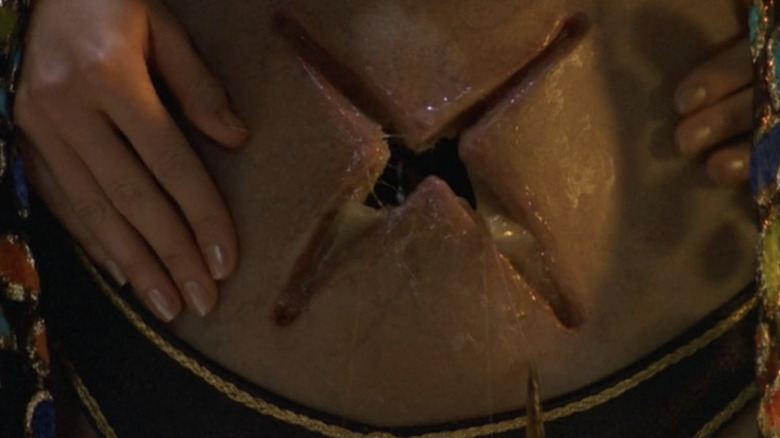MGM Television
Roland Emmerich’s “Stargate” garnered nearly $200 million on a $55 million budget, sparking discussions for a sequel. In fact, Emmerich’s 1994 modest sci-fi success was intended to initiate an entire “Stargate” film trilogy. However, as plans to transition the franchise to television unfolded, Emmerich declined the directorial offer, citing inadequate episode budgets for his grand vision.
Despite this, the idea of a television show persisted and “Stargate SG-1” premiered on Showtime in 1997. The brainchild of Brad Wright and Jonathan Glassner, the series adopted the same premise as Emmerich’s film, chronicling the eponymous team’s adventures as they navigated alien worlds via the Stargate portal. Though the film was a substantial hit, the show cultivated a devoted following and gave rise to several spin-offs including “Stargate: Atlantis,” “Stargate: Universe,” “Stargate: Infinity,” and “Stargate: Origins.” Moreover, “SG-1” played a pivotal role in constructing what became an entertainment empire, with the “Stargate” narrative unfolding across comic books, video games, and novels.
In retrospect, Emmerich might have reconsidered his decision had he known the enduring impact of “Stargate.” However, predicting the longevity of “Stargate” was impossible at the time. Even Wright and Glassner, who were instrumental in the property’s growth, had their share of regrets about the series that sparked it all. Wright, in particular, grappled with two specific elements of the early “SG-1” episodes.
Brad Wright’s issues with Stargate SG-1’s symbiote pouches

MGM Television
While “Stargate SG-1” has a fervent fan base, it is not without its faults. One particularly contentious episode, for example, features Samantha Carter (Amanda Tapping) being captured by a tribe and sold to a warlord, whom she ultimately defeats in battle, thereby enlightening the tribe about women’s rights—a narrative that left much to be desired.
However, for Brad Wright, even this episode isn’t as problematic as two specific aspects of the series. In a 2002 interview with GateWorld, he confessed that he would change these elements if given the chance. As “SG-1” embarked on its sixth season, Wright reflected on some of the choices made during the show’s five preceding seasons. When asked what he would modify if he could revisit the show’s inception, Wright made his aversion clear:
“I would have abandoned the symbiotes in the pouch. I’ve never been fond of those things. O’Neill’s sentiments towards symbiotes and pouches mirror my own. While I appreciated the general concept, its execution was…lackluster.”
The symbiotes were Goa’uld parasites that inhabited the bodies of other organisms, including humans. In the show, the parasites were depicted residing in pouches on Jaffa hosts—a race that serves the Goa’uld. Evidently, Wright was not a fan of this particularly unpleasant portrayal of parasites-housing pouches. Yet, this wasn’t the only element he wished he could redo.
Brad Wright’s remorse over the brief nudity in Stargate SG-1

MGM Television
As “SG-1” started airing on Showtime, the network advocated for increased nudity until one actor pushed back. Known for being somewhat more risqué than other channels, Showtime executives were eager to align their “Stargate” series with the Showtime brand. However, when Samantha Carter actor Amanda Tapping resisted, Showtime executives backed down, and “SG-1” became largely devoid of nudity.
Before the show’s sensibility could be recalibrated to align with this change, a nude scene slipped into the pilot episode. Debuting on July 27, 1997, “Children of the Gods” featured a scene in which Vaitiare Bandera’s Sha’re appears topless. While this was subsequently removed from the episode in later broadcasts, Wright always regretted its initial inclusion. “I also would have eliminated the nudity in the pilot episode,” he told GateWorld. “I was vehemently against it at the time, and even brought my seven-year-old daughter to the rough cut—just to emphasize that I had to remove her from the screening room for two entire scenes.”
In a 2009 GateWorld interview, the co-creator further commented on the nudity controversy. As he explained, while “the studio believed that it would boost the ratings on Showtime,” he and the other producers ultimately recognized that the show would be better without it.
Interestingly, as “SG-1” progressed, Wright’s regrets about the “Stargate” series seemed to multiply. Indeed, he pointed out two other glaring issues with the show in a 2022 Reddit AMA. So, while Emmerich may have missed out on contributing to a surprisingly expansive sci-fi franchise by opting not to participate in “SG-1,” at least he doesn’t have to contend with any pouch or nudity-related regrets.
Credit: www.slashfilm.com


